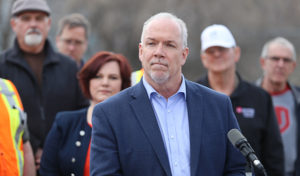This op/ed, by ICBA President Chris Gardner, first appeared in The Province newspaper on Feb. 6, 2018. It is now available for all media outlets to use.
It’s provincial budget time again – the first full-fledged NDP effort in 17 years.
It’s show time for the NDP government, and the scene is set. They assumed office in an enviable fiscal situation: five consecutive balanced budgets, a $2.7 billion surplus, a triple-A credit rating, and a debt-to-GDP ratio hovering just over 16 percent. This legacy of fiscal prudence will be hard to match given the challenges ahead.
 First, B.C.’s overall competitiveness. As the Business Council of B.C. notes, B.C. has the sixth highest marginal effective tax rate for business when compared to 34 OECD jurisdictions and the 10 Canadian provinces.
First, B.C.’s overall competitiveness. As the Business Council of B.C. notes, B.C. has the sixth highest marginal effective tax rate for business when compared to 34 OECD jurisdictions and the 10 Canadian provinces.
While other jurisdictions are working to make their tax regimes more competitive, B.C. is heading in the opposite direction. The top marginal personal income tax rate for those earning more than $150,000 annually in B.C. now stands at 50 percent, up from 43 percent a mere 18 months ago.
Add to this the provincial government’s $5 increase to the carbon tax last fall while ending its revenue neutrality by cancelling offsetting tax cuts and tax credits.
Unfortunately, the list goes on – corporate tax increases, CPP hikes starting in 2019 (a federal measure), and a host of one-off increases to government fees and levies.
Further, the recent moves by the United States to significantly cut taxes will make it more difficult for Canadian companies to compete in the US, unless our federal government and the provinces coordinate more effectively.
Second, the new NDP government is also reviewing a wide-range of government programs and policies, such as environmental assessment rules, WorkSafe B.C. regulations, labour and employment policy, and more – creating a sense of uncertainty and sending negative signals to investors here and abroad about B.C.’s suitability as a place to invest.
Against this rather ominous backdrop, what should Premier Horgan and Minister of Finance James be thinking about as they finalize the provincial budget documents?
Early indications suggest the theme of the budget is affordability, framed largely around housing. So far, talk has centered largely on demand-side measures, such as expanding the foreign buyers tax. However, what really is required are measures to increase supply quickly – freeing up land for development, speeding up permitting and approvals at municipal halls, and taking action to truly increase density around key transit nodes, colleges and universities, and along major traffic corridors.
The NDP government, working with federal and municipal partners, must also get shovels in the ground for new rapid transit projects and value-destroying road bottlenecks.
To help pay for this, the provincial budget must deliver an overarching commitment to grow the economic pie through responsible resource development. Focus is needed to advance LNG projects to successful final investment decisions this year. While the economic reasons are very compelling, so too are the environmental benefits. B.C.’s LNG can help reduce global GHG emissions from more carbon-intensive fossil fuels being used in rapidly growing Asian markets.
The NDP government should also walk back its ill-advised, illegal and reckless attempt to delay construction of the Trans Mountain Pipeline. This $7.4 billion project is in the national interest, and was the subject of an exhaustive review process that stretched nearly three years. Nearly two years ago it was approved by the Trudeau Government with 194 conditions and a commitment to spend $1.5 billion to protect our coastline. The consultation is over, the approval has been granted, it’s time to start building.
At risk is billions in investment, thousands of family-supporting jobs for construction and energy services-related companies, and contract opportunities for Indigenous Nations and communities across the province.
This is reason enough for the premier to ignore Andrew Weaver’s anti-LNG and anti-pipeline rhetoric. B.C.’s economic future is far too important to be held hostage by the whims and policy jiggery-pokery of Weaver’s brand of politics, which seeks to undermine significant, sustainable, and shared prosperity. In just six months, Weaver has demonstrated the danger of having a government propped up by a small group of MLAs focused on a narrow agenda and willing to hold the province hostage to advance its deeply flawed goals.
As Budget 2018 approaches, it’s not too late for Premier Horgan and Finance Minister James to try and recast the NDP’s well-earned reputation in the 1990s for causing economic havoc so that this time the movie ends differently.
Taking a thoughtful, forward-looking approach to jobs and investment would show the public that the NDP government is serious about “building” economic prosperity, not just “sharing” it.
